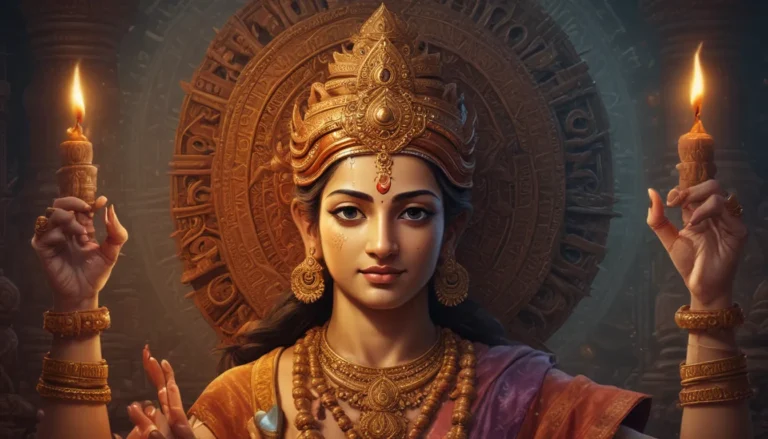The images in our articles may not match the content exactly. They are used to grab your attention, not to show the exact details in the text. The images complement the text but do not replace it.
If you are curious about Ifa, a traditional African religion with deep historical and cultural roots, you have come to the right place. In this article, we will delve into the fascinating world of Ifa, also known as the Yoruba religion, which originates from the Yoruba people of Nigeria, Benin, and Togo. Ifa is not just a religious belief system but a comprehensive philosophy that guides individuals towards spiritual enlightenment and personal growth.
Origins and Significance of Ifa
Ifa is a traditional religious practice that originated among the Yoruba people of Nigeria, dating back thousands of years. It is considered a way of life for the Yoruba people, guiding them in achieving spiritual enlightenment and personal growth. Ifa emphasizes divination, sacrifice, healing, and community celebrations. The religion has also influenced art, culture, and ethical values within the Yoruba community.
Divination and Sacred Texts in Ifa
Divination plays a central role in Ifa, where priests, known as babalawos, communicate with the Orishas (deities) to seek guidance and insight. The sacred text of Ifa, known as the Odu Ifa, consists of verses and stories that offer wisdom, moral teachings, and practical advice for navigating life’s challenges.
Rituals and Practices in Ifa
Sacrifice is an integral part of Ifa rituals and ceremonies, as it helps establish a connection between the spiritual and physical realms, ensuring harmony and blessings. Ifa also incorporates various healing practices, such as the use of herbs, spiritual baths, and prayers, focusing on holistic well-being. Festivals, rituals, and gatherings bring the community together to honor the Orishas, seek guidance, and celebrate their shared heritage.
The Divination System and Gender Roles in Ifa
Ifa divination involves complex methods such as casting cowrie shells or sacred objects to determine messages and guidance from the Orishas. It is a system that requires years of training and expertise to interpret accurately. While Ifa is a male-dominated religion, with men traditionally serving as babalawos and priests, there are also priestesses and women who play significant roles in the practice and rituals.
Influence of Ifa and Moral Code
Ifa has spread beyond Nigeria and gained followers in various parts of the world, particularly among the African diaspora. Its teachings and practices have influenced Afro-Caribbean and Afro-Latin religious traditions. Ifa places great emphasis on moral values and ethical conduct, encouraging followers to live virtuously by showing respect, kindness, and honesty towards others.
Ifa’s Impact on Art, Culture, and Community
Ifa has had a significant influence on Yoruba art, literature, music, and dance. Its symbols and stories are often depicted in sculptures, paintings, and performances, showcasing deep cultural connections to the religion. Ifa is not only confined to individual beliefs but is celebrated as a community experience, bringing people together through festivals, rituals, and ceremonies that honor the Orishas and celebrate their shared heritage.
Conclusion: Embracing the Wisdom of Ifa
In conclusion, Ifa is a fascinating and complex religion that holds deep significance to its followers. With its roots in Yoruba culture, Ifa offers guidance, wisdom, and a connection to the divine for its practitioners. By exploring the rituals, oral traditions, and intricate divination methods of Ifa, individuals can seek clarity, solve problems, and understand their place in the world. It emphasizes the importance of maintaining balance, harmony, and a strong connection with one’s ancestors.
Whether you are already familiar with Ifa or curious to learn more, exploring this ancient religion can provide a deeper understanding of Yoruba culture and traditions. It also offers insights into the universal human pursuit of spirituality and guidance, making Ifa a valuable and enriching spiritual path to explore.
FAQs About Ifa
What is Ifa?
Ifa is a traditional African religion that originated from the Yoruba people of Nigeria, focusing on a complex spiritual and divination system.
How does Ifa divination work?
Ifa divination involves casting objects to communicate with Orunmila, the deity of wisdom, with highly-trained priests interpreting the patterns formed for guidance.
Can anyone practice Ifa?
While Ifa is open to those willing to learn and embrace its teachings, becoming an initiated priest or priestess requires a deep commitment and extensive training.
Is Ifa recognized as a legitimate religion?
Ifa is recognized as an ancient and traditional religion in Nigeria, with efforts made to promote its recognition worldwide.
Are there resources about Ifa available?
Yes, there are books and online resources providing an introduction to Ifa, including its rituals, divination methods, and teachings.
In conclusion, Ifa offers a unique and enlightening perspective on spirituality, interconnectedness, and personal growth. By exploring the rich traditions and practices of Ifa, individuals can gain valuable insights into the cultural heritage and spiritual wisdom it embodies. Whether you are a student of religion, an enthusiast of African culture, or simply curious about expanding your knowledge, exploring Ifa can be a rewarding and enlightening journey.






